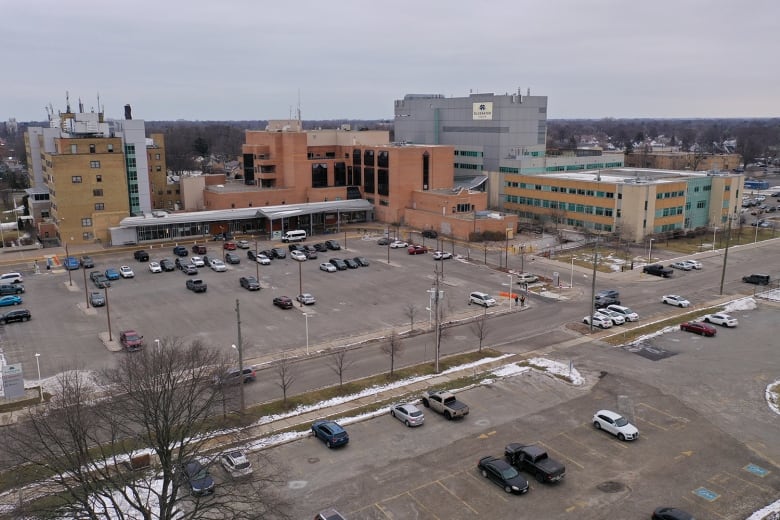After landing in the hospital on Christmas Day, Randy Samms has spent hours considering how close he came to dying from COVID-19. Now he looks forward to an occasion he has long avoided: The day he’ll get vaccinated.
“I was afraid of the vaccine,” said Samms, sitting in a chair beside his hospital bed in the COVID-19 ward at Bluewater Health in Sarnia, Ont. Now, though, “I would say, ‘Definitely get the vaccine.'”
He’s still recovering after spending two weeks in the hospital’s intensive care unit, where Samms was told he was very nearly put on life support. Though he was able to leave the ICU a few days ago, he sometimes still struggles to breathe.
In recent weeks, the hospital’s 14-bed ICU has been overwhelmed with COVID-19 patients, the vast majority of whom hadn’t received their shots.
The Lambton Public Health Unit, which serves Sarnia and its surrounding region in southwestern Ontario, has one of the lowest vaccination rates in the province, with 77 per cent of the eligible population fully vaccinated. The Ontario average is 82 per cent.
This week, CBC News was granted access to Bluewater Health’s ICU and its specially designated COVID-19 ward.
When Samms heard a journalist was in the hallway, he signalled he was keen to share his story. “It could have been a lot worse,” he said in an interview. “I’m lucky to be living.”
WATCH | A look inside Bluewater Health’s dedicated COVID-19 ward:
Mostly unvaccinated patients are overwhelming the ICU at a Sarnia, Ont., hospital and some will head home with a new perspective on COVID-19, the vaccine and life. 3:39
Samms, 64, who is from the Sarnia area, said he’d been discouraged from getting vaccinated against COVID-19 after hearing about side-effects from his daughter and a co-op student at his business.
The vaccines approved for use in Canada have been shown to provide protection against severe COVID-19 symptoms, and multiple studies have indicated the risks posed by the disease heavily outweigh the chance of adverse reactions.
It’s a message he now wants to share with others: “Don’t be afraid of the vaccine,” Samms said. “You certainly don’t want to be put on life support or be put out, because it could cost you your life.”
Samms said he visited Niagara Falls, Ont., about a week before Christmas. Within days of that trip, he started to experience symptoms. Then, on Dec. 25, “I couldn’t handle it anymore,” he said. “That’s why I ended up here.”
He encountered a hospital nearing capacity, with Bluewater staff shouldering the burden from both an influx of sick patients and colleagues feeling ill or isolating. “I couldn’t believe how big it was and how busy it was,” Samms recalled.
His wife fell ill, too, losing her sense of smell and taste, and coughing up blood. While she recovers at home, the couple can only see each other on FaceTime. Samms said he expects they’ll both get vaccinated as soon as they can.
Dr. Mike Haddad, the hospital’s chief of staff, said raising the issue of inoculation with sick, unvaccinated patients can be delicate. Staff always focus on treatment first, he said, and later recommend getting the shot — after the hospital stay.
“I don’t discuss vaccination right away,” Haddad said. “Some patients on their own tell me, ‘I wish I had the vaccine.’ Some of them say they don’t believe in it anyway.”
As of Thursday, Bluewater Health said 75 per cent of the COVID-19 patients in the hospital’s ICU were unvaccinated. On some recent days, Haddad said, the proportion was as high as 100 per cent.
That’s a higher rate than what’s being seen across Ontario, where just over half of those requiring intensive care are unvaccinated.
Young COVID patient ‘just passed out’
In a room down the hall from Samms is 21-year-old Jordan Ayers; he’s watching sports on the small TV above his bed.
“I never thought I’d be here — but I am,” he said.
COVID-19 tore through his family, first infecting his niece, sister and mother. Then on Jan. 2, when Ayers got up to go to the bathroom at home, he collapsed. He can barely recall what happened in the days that followed.
“I guess I just passed out,” he said. “And then I ended up in an ambulance that ended up here.”

Staff at the hospital found his oxygen levels to be so low, he later needed to be admitted to the ICU and put on life support. He’s now recovering in the COVID-19 ward and building up enough strength to walk again.
Although it’s unusual for a patient so young to require such acute care for the disease, staff at Bluewater Health say they’ve noticed a new patient profile since the start of the Omicron wave.
“We’re seeing a lot of sicker, younger people — and sending a lot to ICU,” said registered nurse Aleeza Dobson, who tends to patients in the COVID-19 ward. “It’s pretty overwhelming.”
Earlier this month, the situation became so worrisome that Bluewater Health issued an open letter to the community, noting it had more than quadrupled the number of COVID-19 patients in the hospital, from seven to 31.
“Our ICU is seeing younger COVID patients — many in dire situations. Most patients with severe COVID disease are not vaccinated yet and we are having end-of-life discussions with families of patients in all age categories — not just older ages,” the letter read.
In addition to reopening the dedicated COVID ward, the hospital shut down all but the most urgent surgeries, while the number of staff on sick leave was up by almost five times its average. Nurses at the hospital also told CBC that several colleagues have retired during the pandemic, and the remaining staff have felt the added pressure.

But Haddad said he hopes Bluewater Health has seen the peak of COVID-related hospital admissions in this wave, noting the region’s rise in hospitalizations started in mid-December, earlier than in other parts of the province.
“I honestly think we’re like a bellwether,” he said. “I have a feeling the rest of Ontario is probably two weeks behind us.”
Haddad also points to the experience of some other countries amid the Omicron-driven wave, where infections and hospitalizations have declined as fast as they rose. He’s hoping to see the same throughout Ontario.
“I’m hoping it’ll be a fast up and then down.”






More Stories
‘Learn to walk again’: Sask. doctor tells story of miracle recovery from deadly heart condition
Canadians more likely to eat food past best-before date. What are the risks? – National | Globalnews.ca
What a urologist wants you to know about male infertility